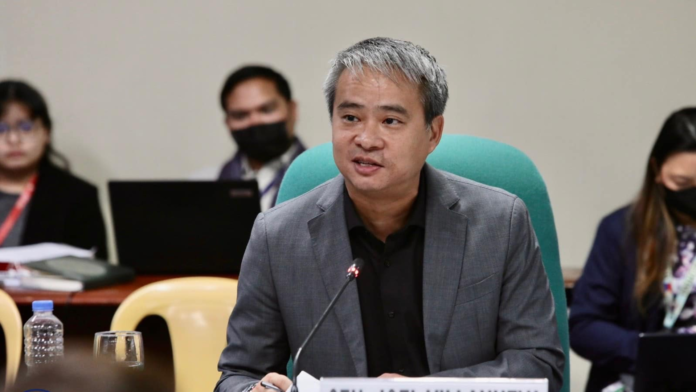A senator said President Ferdinand R. Marcos Jr. wants to empower Filipinos by signing into law Republic Act (RA) 11962 or the Trabaho Para sa Bayan Act.
Senate Majority Leader Joel Villanueva, who principally authored and sponsored the law, said on Wednesday the new law would be the “cornerstone” of government initiatives in providing job opportunities for Filipinos and addressing variabilities in the country’s labor market.
“Nagpapasalamat tayo sa ating Pangulo dahil ninanais niya na magkaroon po kayo ng trabaho, hindi po bigyan lamang ng isda, kundi turuan kung papaano mangisda at papaanong mabuhay ng disente, marangal at higit sa lahat mapagtagumpayan ang anumang problema o pagsubok na ating mararanasan dahil may trabaho po tayo (We thank our President because of his desire for you to have jobs, not only to give you fish, but teach you how to fish and how to live decently, honestly, and above all, overcome any problem or challenges that we experience because we have a job),” he said.
“Kapag may trabaho po kasi tayo, may pambili tayo ng gamot, may pampaaral po tayo, nakakatulog tayo nang mahimbing sa gabi at alam natin merong mas magandang bukas na naghihintay para sa atin. Ito ang regalo ng ating Pangulo at regalo ng ating Kongreso sa ating mga kababayan (If we have a job, we can buy medicine, finance schooling, can sleep well at night, and expect a better future. This is a gift of our President and our Congress to our countrymen).”
Villanueva attended the ceremonial signing of RA 11962 held in Malacañang together with Senate President Juan Miguel Zubiri, Senator Imee Marcos, House of Representatives Speaker Martin Romualdez, and Cabinet secretaries.
The law, he said, would help assure that there would be jobs waiting for the 1.2 million individuals being added to the Filipino workforce every year.
“With this, we will be able to anticipate also the industries involved; saan yung mga nakikita nating mga bagay na pwede bang i-improve; paano natin masi-seize yung opportunity dahil magagaling yung Pinoy sa ganitong larangan; papaano natin makukuha yung mga trabahong ito hindi lang dito sa buong Pilipinas, sa loob ng ating bansa, maging sa ibayong dagat (what could be improved; how we can seize the opportunity because Filipinos are good in this field; how we could secure these jobs not only here in the Philippines, but also abroad),” Villanueva said.
RA 11962 aims to institutionalize a National Employment Master Plan to promote job-led economic growth and enhanced industry collaboration, provide overall services for worker development, and push for support and incentives to businesses.
The master plan, which has a three-, six-, and 10-year development timeline, includes initiatives for supporting micro, small and medium enterprises, worker upskilling, employer incentives, youth employment, as well as the reintegration of overseas Filipino workers.
It will also establish the Trabaho Para sa Bayan Inter-Agency Council, which will monitor, review, and evaluate the implementation of the components of the plan.
The council will be composed of the heads of the National Economic and Development Authority, departments of trade, labor, budget, finance, and interior and local government, the Technical Education and Skills Development Authority, and representatives of employers’ organizations, labor groups, marginalized sector, and the informal sector.
Villanueva said the passage of the Trabaho Para sa Bayan law is also a fulfillment of the Philippines’ commitment to the International Labor Organization (ILO) Convention 122, or the Employment Policy Convention, which calls for an active employment policy to be pursued as a major goal of macroeconomic policy.
The Philippines in 1976 ratified ILO Convention 122, which states that “each member state shall pursue, as a major goal, an active policy designed to promote “full, productive and freely chosen employment.” (PNA)
Photo credit: Facebook/senateph


